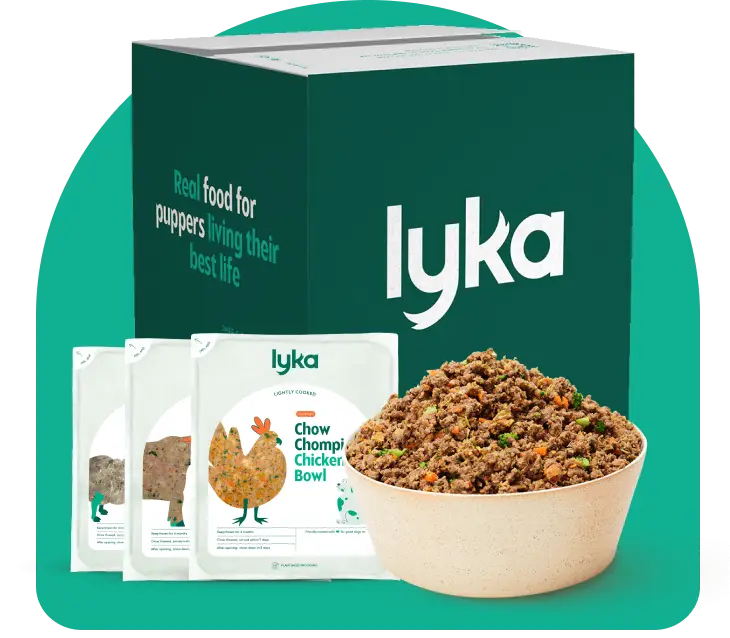Has my dog got IBD?
By Helene Mann

It’s not just us who can suffer from an irritable bowel.
Our pups can too, and when they do, it can really affect their wellbeing. Inflammatory bowel disease, (or IBD for short), has no cure, so managing symptoms and avoiding triggers you think may be causing them is key to keeping your pupper healthy.
What are the symptoms of IBD?
Symptoms vary from dog to dog, but generally come and go. Often there are periods of time where the symptoms are severe followed by periods where they may decrease in severity or even disappear before returning again. Signs your pup may have IBD include:
Chronic vomiting if the stomach is involved, or diarrhoea if it’s the intestines that are affected – both can happen at the same time
The vomit may contain small amounts of blood or bits of undigested food
IBD can affect appetite, up or down – your dog may be off their food and losing weight, or super hungry if their body isn’t absorbing nutrients from their food
Your dog may also be unusually lethargic
Why does my dog have IBD?
Like its name suggests, IBD involves inflammation. High numbers of inflammatory immune cells in your pup’s digestive tract affect their ability to absorb nutrients from their food. Like many digestive issues, what actually causes this is a little fuzzy. All sorts of factors may be involved, including a dog’s genetics, food allergies or sensitivities, bacterial overgrowth or infection in the gut, abnormal immune function and issues with the microbiome.
To confirm that your dog has IBD, they’ll need a biopsy – but as this is quite invasive, your vet may decide it’s best simply to manage symptoms regardless of a diagnosis.
Why is my pup’s microbiome important?

Your pup’s gut, like ours, contains trillions of micro-organisms that should be balanced and living in harmony together. It’s what we call their microbiome, and it not only plays a very important part in their gut health and digestion, but can also benefit their immune system and wellbeing overall. It takes the right sort of quality ingredients and nutrients to keep the microbiome healthy, which is why it’s so important what we feed our puppers.
How do I treat my pup’s IBD?
Diet and medication are the key ways to manage your dog’s IBD. Sounds tricky? It isn’t if you speak to a holistic vet – they’ll help guide you. They might recommend:
Trying an elimination diet – this involves feeding a bland diet for 12 weeks, and then slowly reintroducing ingredients one by one and observing changes in symptoms to determine which foods trigger symptoms
Including easily digestible, gut-soothing ingredients, plus prebiotic foods to support the microbiome – this can result in significant, long term benefits
Using herbal or pharmaceutical medications, sometimes for the long term
There’s likely to be plenty of trial and error in finding the right solution for your dog’s IBD, so you’ll need to be patient. Keep a diary and note down any changes in your pup’s diet so that you can track symptom changes. That way you’ll be able to see which foods work or don’t work for your dog!
Watch out for any reactions
Dehydration and electrolyte balances resulting from vomiting or diarrhoea can be life threatening, so if a flare up occurs, see your vet immediately.
Try out Lyka if your dog has IBD
If you’re concerned about your pupper’s digestion, then we’ve got some recipes for you! Our Chicken recipe is low in fat, in particular saturated fat, which makes it gentler on sensitive tummies, while maintaining a full range of fresh-food nutrients. It also doesn’t have any fish, and provides omega-3 fatty acids from fish oil. Our Turkey recipe has low-moderate fat that is hypo-allergenic and is great for gastrointestinal health. It has a limited set of ingredients, while still having plenty of antioxidants and fibre.
Go slow with the change
If your dog has sensitivities and a history of gastrointestinal issues, it’s best to take any food transition slowly. Rather than the usual 1 week transition period when changing to a new diet, for dogs with digestive concerns, we generally recommend taking 2-4 weeks to transition to a more varied Lyka meal plan.
Here’s what we suggest:
Start with about 10% Lyka
Add 10% increments every 3 days until fully transitioned
If your pup’s stools start to look unusual, wait until it’s back to normal before continuing to change their food.
Experience the Lyka effect!
Lots of our customers’ puppers have IBD and gastro issues. See how Louie thrives with Lyka!





